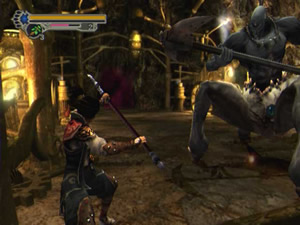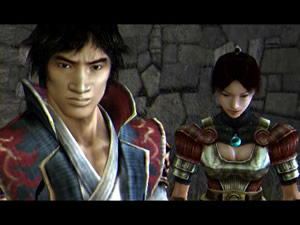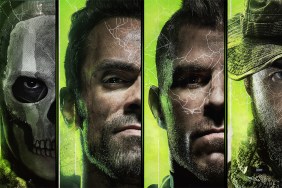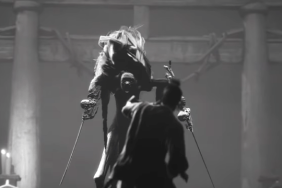Honoring the undead.
You can shoot it, you can chop it up and you can even set it on fire, but there’s
no real way to keep a good zombie down. Sure, some of the lesser undead can be
stopped. In fact, the last time we met, the lone samurai Samanosuke had defeated
the evil Demon King and saved Japan from a new era of darkness. Fortinbras was
a wuss, anyway.
But
with the Throne of Darkness vacant, what zombie would be powerful enough to
assume control of the legions of undead warriors bent on world destruction?
Well, Zombie Duke
was too busy sitting on the Throne
of Game Revolution, so it looks like we’ll have to settle on an undead Oda
Nobunaga instead.
Yep, that’s right. Nobunaga has taken the reigns of the undead armies and
is picking up where his predecessor left off. You know, death, destruction…all
that jazz. Ten years later, Samanosuke is nowhere to be found, but a new hero
has risen up to take his place. His name? Yagyu Jubei. His game? Onimusha
2: Samurai’s Destiny.
Those of you familiar with Onimusha won’t have
any problems diving right into Samurai’s Destiny. Control is identical
and gameplay is essentially still the same hack n’ slash/puzzle solving/find-the-green-herb
with a few new improvements thrown in for good measure. Even if you somehow
missed the first game, it won’t take you long to become a worthy swordsman –
just think Resident Evil with a sword and you’ve got the basic idea.
But while this sequel upholds the honor of the series, there are still a few
flaws in the quality blade.
Like the original, Onimusha 2 starts off with an impressive visual
display worthy of any Hollywood production. Jubei’s village is getting trashed
and naturally our hero isn’t around to defend it. You can’t have an epic tale
of revenge without a little trouble, right? These visual effects stay in top
form throughout the game with the photo-realistic backgrounds and well-modeled
characters we’ve come to expect from the Onimusha series.
Unfortunately, the audio isn’t as satisfying as the last go round. Though
the original game supported Japanese dialogue with English subtitles, Onimusha
2 is jammed in strictly English mode. The dub quality is actually better
than most, but if you’re a purist like me, it’s hard to go back to hamburger
after having filet mignon for so long.
One of the most noteworthy additions in Samurai’s Destiny is the cast
of four supporting characters that Jubei will interact with during his adventures.
There’s Ekei, the spearman, Oyu, the Japanese version of Soul
Calibur‘s Sophitia, Magoichi, the man with a gun, and Kotaro, the obligatory
ninja. In addition to conversing with these characters to gain information,
Jubei has a unique way of interacting with the crew – gift giving. Jubei can
hand out items he’s picked up along his journeys like a samurai
Santa Claus. Give characters things they’ve always wanted and they’ll reward
you not only with more useful items, but help in combat. Just who comes to the
rescue will be determined by your degree of friendship with them. You’ll even
take control of them during certain portions of the game.
 It
It
doesn’t end there though, as interaction with these characters plays an integral
role in story development. Onimusha 2 has a somewhat branching storyline
that is dependent upon who your friends are. This adds another dimension to
the replay value of the game, as you’ll need to play more than once to uncover
the entire story.
And speaking of replay value, completing the game will unlock a few more goodies
to bring you back for more. Several mini games can be found, including (but
not limited to, *wink, wink*) “The Man in Black” and “Team Oni.” “The Man in
Black” puts Jubei into a stylish new suit and arms him with a big stick. His
mission this time is to collect 20 film reels and reach the exit within the
time limit. It won’t take you long to pass this one, but you’ll be rewarded
with some in-game cutscenes. “Team Oni” lets you run through a few of the game’s
levels with a tag team of several characters. It’s much more challenging than
“The Man in Black,” but it really isn’t anything to write home about.
It’s a good thing that there are more distractions, because the main game is
still on the short side. While longer than the original, Onimusha 2 again
feels a little too short. Factor in replay time for those pieces of the story
you missed, though, and things look a little better.
Another small problem that lingers from the original is the occasional bum
camera angle. Thanks to the dramatic fixed camera angles that Capcom is so fond
of, you’ll sometimes be stuck looking at the back of an enemy or fighting a
monster that isn’t even on screen. This problem isn’t too hard to work around,
but it sure is annoying.
But when the last demon has dropped, you’ll still find a certain sense of
satisfaction that can only be found in a game with zombies and samurai. Solid
gameplay with plenty of new improvements make Onimusha 2: Samurai’s Destiny
another fine blade.

-
Still fun
-
The more the merrier
-
Branching paths
-
Some replay value
-
Wakarimasen!
-
Still a little short
-
Bum camera angles







